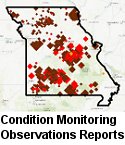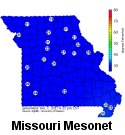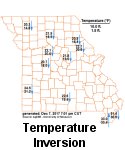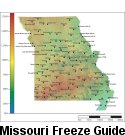
Rains bring drought relief to Missouri
Zack Leasor
State Climatologist
University of Missouri Extension
Phone: 573-882-5908
Email: leasorz@missouri.edu
Friday, May 17, 2024
COLUMBIA, Mo. - Most of Missouri has transitioned out of drought conditions for now, said University of Missouri Extension state climatologist Zack Leasor.
"The past two months have brought abundant rainfall to most of Missouri," Leasor said. "After back-to-back drought years in 2022 and 2023, drought concerns were high in early 2024 following warm and dry conditions in February and March."
Conditions took a turn for the better in April, he said. Statewide precipitation was 6.01 inches, 2.04 inches above the monthly average, making April 2024 the Missouri's 15th-wettest April back to 1895, based on preliminary data from the National Oceanic and Atmospheric Administration. Several locations in western Missouri received just over 10 inches of rainfall during April. At the end of April, year-to-date precipitation in Missouri was 12.87 inches, 1.58 inches above average. The wet and warm pattern has continued into the first half of May.
Soil moisture recharge and improvements to streamflow have been significant, Leasor said. On April 1, 58% of the U.S. Geological Survey monitoring gauges in the state recorded at least below-normal streamflow (< 25th percentile); that number dropped to 1% as of May 15.
"Agricultural drought impacts have been absent, but the timing of rainfall early in the growing season has made planting and planning fieldwork difficult," he said. "Groundwater has been slower to recover after several years of dry conditions, but there have been improvements since April."
The May 14 update from the United States Drought Monitor shows that only 17.98% of Missouri is currently classified as either abnormally dry or in moderate drought; these locations are in southern and southeastern Missouri.
"This is a large improvement from just six weeks ago, when 66.55% of the state was classified as abnormally dry or drought on April 2," said Leasor.
This active weather pattern is expected to continue through the end of May, and the Climate Prediction Center forecasts a higher probability for above-average precipitation during June.
"Even with widespread improvements in the short term, Missouri's vulnerability to drought is still higher than usual this year based on some of the long-term dryness and above-average temperatures through the beginning 2024," Leasor said. "Also, forecasters are monitoring a shift from El Niño to La Niña conditions in the Pacific Ocean. Cooler ocean temperatures during La Niña conditions have an impact on atmospheric circulation, and while there is significant uncertainty in long-range forecasts, warmer and drier summertime conditions have been observed in the central U.S. during previous La Niña events."
Missouri Gov. Mike Parson recently continued the state's drought alert to Sept. 1, and Missouri's Drought Assessment Committee will continue to monitor conditions over the summer.
Maps and tables available for this release:
 2024 has featured the state's warmest February on record,
2024 has featured the state's warmest February on record, with below-average precipitation during both February and March.
 April 2024 precipitation data for selected sites in Missouri.
April 2024 precipitation data for selected sites in Missouri.
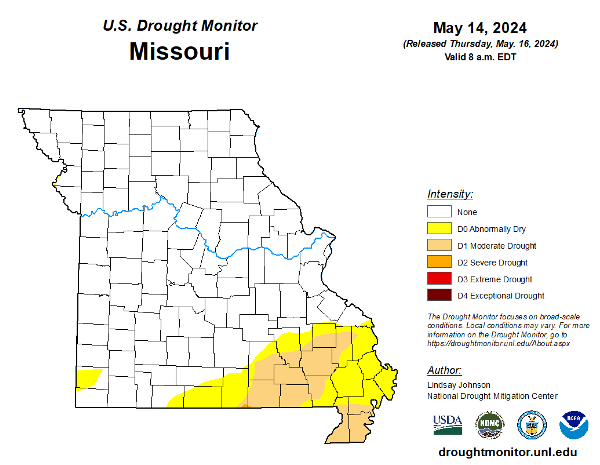 As of May 14, less than 20% of Missouri is classified as
As of May 14, less than 20% of Missouri is classified as abnormally dry or in moderate drought.
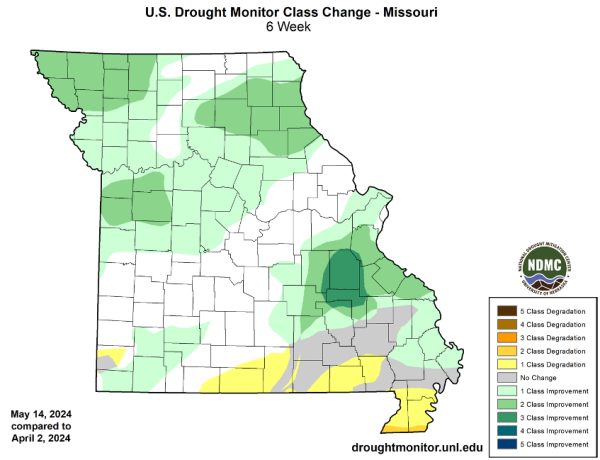 From April 2 to May 14, 2024, Missouri has seen significant
From April 2 to May 14, 2024, Missouri has seen significant improvement in drought status.
Source: Zack Leasor, 573-882-5908


